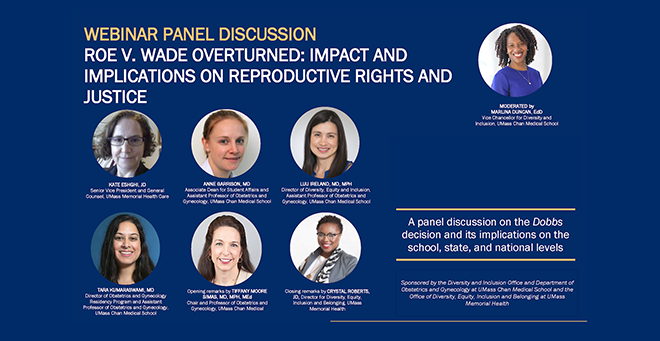
The medical neighborhood wants to make use of its experience, voice and privilege to guard complete affected person care within the aftermath of the US Supreme Court docket’s choice in Dobbs v. Jackson Girls’s Well being Group, which overturned practically 50 years of constitutionally protected abortion, a panel of UMass Chan Medical College obstetrics and gynecology school and a lawyer representing UMass Memorial Well being mentioned in a webinar panel dialogue on Wednesday, July 27.
The courtroom’s choice has “scary” ramifications for a variety of affected person care points from contraception to most cancers therapy, “exponentially exacerbates” well being inequities and has added complexities to graduate medical training choices for trainees, the panel mentioned.
The panel, which was moderated by Marlina Duncan, EdD, vice chancellor for variety and inclusion at UMass Chan, featured Anne Garrison, MD, assistant professor of obstetrics & gynecology and affiliate dean for scholar affairs; Luu Eire, MD, MPH, assistant professor of obstetrics & gynecology; Tara Kumaraswami, MD, assistant professor of obstetrics & gynecology and director of the obstetrics & gynecology residency program; and Kate Eshghi, JD, senior vice chairman and normal counsel at UMass Memorial Well being. Tiffany Moore Simas, MD, MPH, MEd, the Donna M. and Robert J. Manning Chair in Obstetrics and Gynecology and chair and professor of obstetrics & gynecology provided opening remarks and Crystal Roberts-Gilbert, JD, director for variety, fairness, inclusion and belonging at UMass Memorial Well being Care made closing remarks.
“I’m proud to be chair of obstetrics and gynecology right here the place we stay dedicated to offering prime quality, evidence-based, secure reproductive well being take care of all of our sufferers throughout all of their reproductive well being wants,” mentioned Dr. Moore Simas. “And we stay dedicated to educating the present and subsequent generations of clinicians to supply complete well being care, together with the complete spectrum of reproductive well being care. And this, after all, contains abortion.”
Physicians on the panel expressed gratitude that they have been training and coaching clinicians in Massachusetts, which protects abortion rights. However they have been devastated by what they’re seeing in roughly half the states, the place abortion bans and restrictions, and in some instances criminalizing the process, have gone or are going into place.
Offering authorized context, Eshghi mentioned, “The ramifications of Dobbs are far reaching, initially for entry to reproductive care and the rights and choices of pregnant folks. There was a right away exponential enhance in obstacles to care. The obstacles that exist already for low-income folks, minors, these residing in areas with restricted entry have elevated . . . The Dobbs case creates authorized uncertainty and danger for suppliers, sufferers and individuals who could grow to be pregnant throughout the nation.”
A number of panelists mentioned that though abortion is authorized right here, Massachusetts residents in search of care will quickly be going through longer wait occasions as clinics take in volumes of sufferers turned away in different states. And extra sufferers will probably be in search of abortions later of their being pregnant due to the time wanted to journey, which can additional pressure the supplier community.
Dr. Eire mentioned she has already seen two sufferers from Texas, who had the assets and privilege to journey to Massachusetts for his or her procedures.
“What I am listening to from some of us (in states with bans) is that turning sufferers away is de facto, actually onerous,” mentioned Eire. “It is actually onerous when you’ve got the talents and information to take care of the individual in entrance of you and you are not legally in a position to take action.”
Dr. Kumaraswami mentioned she has seen rising numbers of sufferers ask for sterilization or search to interchange their IUD sooner than normal due to considerations about potential future entry in case of an sudden being pregnant.
Well being dangers in states with abortion bans lengthen past reproductive care to doubtlessly stopping individuals who is likely to be pregnant from receiving some life-saving most cancers remedies or speedy take care of ectopic being pregnant, additional worsening maternal morbidity and mortality charges, panelists mentioned.
Dobbs has additionally raised concern that medical college students and trainees will now not be assured of entry to studying methods to present important well being companies, not solely to folks in search of abortions but in addition to handle miscarriages. The UMass Chan chapter of Medical College students for Alternative is devoted to making sure entry for all folks to complete reproductive well being care and has been energetic at UMass Chan in advocating for the continuation of the complete spectrum of reproductive well being care within the curriculum, mentioned Kumaraswami, who serves because the group’s school advisor.
College students at UMass Chan follow first trimester guide vacuum respirations utilizing a papaya as a uterus mannequin. They study treatment abortion and in third- and fourth-year rotations have the chance to be within the clinic, the place they see sufferers preoperatively for miscarriage or abortion after which go to the working room with the doctor.
Medical college students considering careers in obstetrics and gynecology face new challenges. “It definitely has impacted the best way our learners are fascinated about the place they might do their coaching and it has impacted our packages,” mentioned Dr. Garrison.
Widespread abortion bans may have severe penalties for marginalized communities, Eire mentioned. “We all know that people who needed an abortion that didn’t get an abortion are a lot much less more likely to be employed, they are much much less more likely to go away violent relationships, they are much extra more likely to expertise melancholy, they’re extra more likely to depend on public help. These are lifelong impacts that not solely have an effect on them, however trickle down by way of generations.”
Eire additional warned that even with self-managed abortion utilizing mifepristone and misoprostol, which may largely be achieved safely, there will probably be some individuals who want emergency care. In some states now, sufferers who search emergency care might make themselves susceptible to legal prosecution. “We all know that Black and brown individuals are more likely to be prosecuted than white folks, and that is going to be the identical with regards to self-managed abortion,” she mentioned.
Panelists provided the next actions to guard entry to all well being care: Vote for candidates who assist abortion rights, even on the native degree; contemplate working for workplace; get entangled within the American School of Obstetricians and Gynecologists and state medical societies; and take a stand when one thing just isn’t proper.
“We predict lots about professionalism in medical college,” mentioned Eire. “Professionalism, bear in mind, is doing what is true to honor your medical obligations to your colleagues and your sufferers. It’s not following the principles as a result of typically the principles will not be honest, they usually perpetuate inequality they usually perpetuate hurt. [You] can use your voice and your privilege to attempt to form and redirect the system.”
